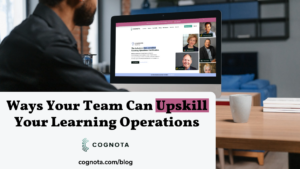Love ’em, hate ’em, the importance of subject matter experts (SMEs) and working with them cannot be overstated.
Certainly, creating project timelines is important to maximize the SME’s time, but how do you go about sourcing the right-fit SME for a learning project in the first place?
Some learning teams “inherit” experts. In some cases, the same individuals serve as the providers of valuable content on which a course is built year after year—with no possibility of a change.
In other cases, the team, department, or division does its own selection, and sometimes, it is up to the L&D team to source the SME.
Below, we outlined a few ways to find the best subject matter experts for your training project.
Working with SMEs is not always smooth sailing. Watch this recorded webinar featuring Peggy Salvatore, author of “Working with SMEs: A Guide to Gathering and Organizing Content from Subject Matter Experts” for the most efficient methods of knowledge capture.

Internal word-of-mouth (your best bet)
Referrals, of course, make the most sense because the SME has already been vetted in some way.
As noted above, the department might rely on the same expert or group of experts time after time to help build courses, edits existing ones, or develop support materials. However, this is where learning leaders can step in and ask the hard questions. Is the SME working out? What is the feedback or success rate of the courses developed and/or facilitated by the SME?
Sometimes an expert is just that: an expert in their field, but they lack the skills to transfer that knowledge properly to a course. In this case, L&D can either level up the SME in instructional design skills or explain to the department that they will need to source new expertise for their learning needs.
Training intake forms
Another channel to identify the right SMEs can be through your training intake forms. Indeed, one of the questions on the training intake form could very well be, “Have you identified a subject matter expert to assist in the development of the course?”
The more robust the training intake system, and the more detailed the training intake form, the easier it will be for L&D to select the courses worthy of development, and the faster the team can get started building those courses. This is because the responses provided by the submitter would essentially jumpstart the Analysis phase of ADDIE—greatly assisting the learning team.
LinkedIn, professional associations and, well, Google
As another resource, turn to LinkedIn, professional associations, and even Google to help you identify the right expert to help you build a course.
This can help not only to identify the right individual, but it can also help you and your team validate whether a candidate is right for the project. If the expert has published links to past presentations, perhaps even video clips on YouTube, you can get a much clearer idea of whether there would be the perfect fit.
On the other hand, finding a great candidate with a seemingly perfect LinkedIn profile that does not indicate that the expert has helped build courses, can be a red flag.
Indeed, eLearning Industry cites the determining of a candidate’s quantity and quality of experience, and the ability to verify credentials, as two of 7 tips to finding the right subject matter expert for a learning project.
Final Thoughts
While there is no single best way to find your perfect subject matter expert, think of it as a recruiting exercise. Sure, you can make referrals and speak with experts with strong recommendations behind them. However, as part of the learning team, you also want to be sure that the expert will be able to deliver the right content in the right way at the right time.
While indications of previous experience building courses can be a plus, you might need to “train the trainer” a bit to ensure that the SME is equipped with an understanding of the correct processes and tools to be able to contribute the much-needed content. It’s important to build in a few hours at the beginning of a learning project for this type of training.
However, pattern recognition can go a long way. Provide your new SME with examples of previously successful courses, demonstrating what success looks like. In this way, the expert will have a good model on which to base the new content.
Free Toolkit: The Secret Formula for Working With SMEs
Get the templates, tools, and guidance you need to make all your SME relations as productive as possible.
Download Now





